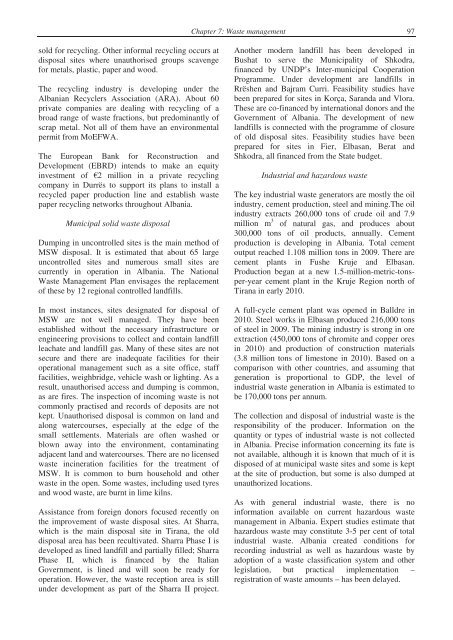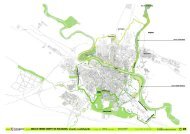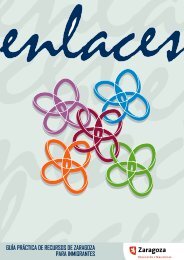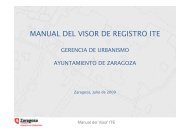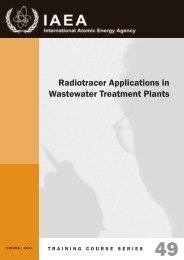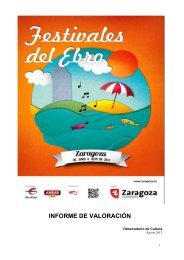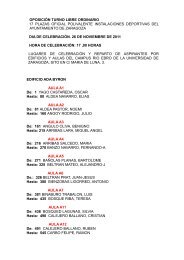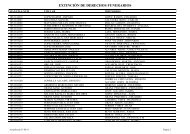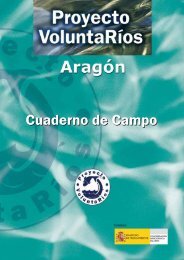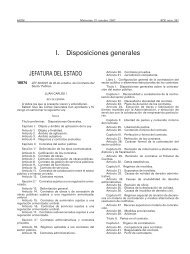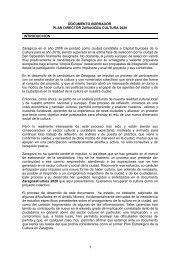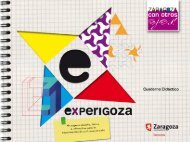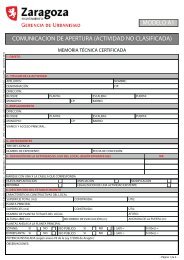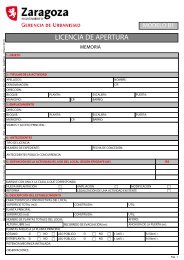Second Environmental Performance Review of Albania
Second Environmental Performance Review of Albania
Second Environmental Performance Review of Albania
You also want an ePaper? Increase the reach of your titles
YUMPU automatically turns print PDFs into web optimized ePapers that Google loves.
Chapter 7: Waste management97sold for recycling. Other informal recycling occurs atdisposal sites where unauthorised groups scavengefor metals, plastic, paper and wood.The recycling industry is developing under the<strong>Albania</strong>n Recyclers Association (ARA). About 60private companies are dealing with recycling <strong>of</strong> abroad range <strong>of</strong> waste fractions, but predominantly <strong>of</strong>scrap metal. Not all <strong>of</strong> them have an environmentalpermit from MoEFWA.The European Bank for Reconstruction andDevelopment (EBRD) intends to make an equityinvestment <strong>of</strong> €2 million in a private recyclingcompany in Durrës to support its plans to install arecycled paper production line and establish wastepaper recycling networks throughout <strong>Albania</strong>.Municipal solid waste disposalDumping in uncontrolled sites is the main method <strong>of</strong>MSW disposal. It is estimated that about 65 largeuncontrolled sites and numerous small sites arecurrently in operation in <strong>Albania</strong>. The NationalWaste Management Plan envisages the replacement<strong>of</strong> these by 12 regional controlled landfills.In most instances, sites designated for disposal <strong>of</strong>MSW are not well managed. They have beenestablished without the necessary infrastructure orengineering provisions to collect and contain landfillleachate and landfill gas. Many <strong>of</strong> these sites are notsecure and there are inadequate facilities for theiroperational management such as a site <strong>of</strong>fice, stafffacilities, weighbridge, vehicle wash or lighting. As aresult, unauthorised access and dumping is common,as are fires. The inspection <strong>of</strong> incoming waste is notcommonly practised and records <strong>of</strong> deposits are notkept. Unauthorised disposal is common on land andalong watercourses, especially at the edge <strong>of</strong> thesmall settlements. Materials are <strong>of</strong>ten washed orblown away into the environment, contaminatingadjacent land and watercourses. There are no licensedwaste incineration facilities for the treatment <strong>of</strong>MSW. It is common to burn household and otherwaste in the open. Some wastes, including used tyresand wood waste, are burnt in lime kilns.Assistance from foreign donors focused recently onthe improvement <strong>of</strong> waste disposal sites. At Sharra,which is the main disposal site in Tirana, the olddisposal area has been recultivated. Sharra Phase I isdeveloped as lined landfill and partially filled; SharraPhase II, which is financed by the ItalianGovernment, is lined and will soon be ready foroperation. However, the waste reception area is stillunder development as part <strong>of</strong> the Sharra II project.Another modern landfill has been developed inBushat to serve the Municipality <strong>of</strong> Shkodra,financed by UNDP’s Inter-municipal CooperationProgramme. Under development are landfills inRrëshen and Bajram Curri. Feasibility studies havebeen prepared for sites in Korça, Saranda and Vlora.These are co-financed by international donors and theGovernment <strong>of</strong> <strong>Albania</strong>. The development <strong>of</strong> newlandfills is connected with the programme <strong>of</strong> closure<strong>of</strong> old disposal sites. Feasibility studies have beenprepared for sites in Fier, Elbasan, Berat andShkodra, all financed from the State budget.Industrial and hazardous wasteThe key industrial waste generators are mostly the oilindustry, cement production, steel and mining.The oilindustry extracts 260,000 tons <strong>of</strong> crude oil and 7.9million m 3 <strong>of</strong> natural gas, and produces about300,000 tons <strong>of</strong> oil products, annually. Cementproduction is developing in <strong>Albania</strong>. Total cementoutput reached 1.108 million tons in 2009. There arecement plants in Fushe Kruje and Elbasan.Production began at a new 1.5-million-metric-tonsper-yearcement plant in the Kruje Region north <strong>of</strong>Tirana in early 2010.A full-cycle cement plant was opened in Balldre in2010. Steel works in Elbasan produced 216,000 tons<strong>of</strong> steel in 2009. The mining industry is strong in oreextraction (450,000 tons <strong>of</strong> chromite and copper oresin 2010) and production <strong>of</strong> construction materials(3.8 million tons <strong>of</strong> limestone in 2010). Based on acomparison with other countries, and assuming thatgeneration is proportional to GDP, the level <strong>of</strong>industrial waste generation in <strong>Albania</strong> is estimated tobe 170,000 tons per annum.The collection and disposal <strong>of</strong> industrial waste is theresponsibility <strong>of</strong> the producer. Information on thequantity or types <strong>of</strong> industrial waste is not collectedin <strong>Albania</strong>. Precise information concerning its fate isnot available, although it is known that much <strong>of</strong> it isdisposed <strong>of</strong> at municipal waste sites and some is keptat the site <strong>of</strong> production, but some is also dumped atunauthorized locations.As with general industrial waste, there is noinformation available on current hazardous wastemanagement in <strong>Albania</strong>. Expert studies estimate thathazardous waste may constitute 3-5 per cent <strong>of</strong> totalindustrial waste. <strong>Albania</strong> created conditions forrecording industrial as well as hazardous waste byadoption <strong>of</strong> a waste classification system and otherlegislation, but practical implementation –registration <strong>of</strong> waste amounts – has been delayed.


